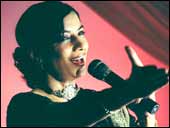 Journalist-turned-filmmaker Khalid Mohamed's Tehzeeb released to mixed reviews and a not-so-encouraging audience response on December 5. Touted as a tribute to Ingmar Bergman's 1978 classic Autumn Sonata, the Hindi inspiration seems to be made with more than an eye on the box-office, with endless 'item numbers' and needless sub-plots.
Journalist-turned-filmmaker Khalid Mohamed's Tehzeeb released to mixed reviews and a not-so-encouraging audience response on December 5. Touted as a tribute to Ingmar Bergman's 1978 classic Autumn Sonata, the Hindi inspiration seems to be made with more than an eye on the box-office, with endless 'item numbers' and needless sub-plots.
But actor Shabana Azmi -- not surprisingly -- delivers another stirring performance and comes out with her reputation as a thinking, responsible actor intact.
The unprecedented five-times National Award winner even stands out among the host of young heroines and semi-clothed beauty queens (Urmila Matondkar, Dia Mirza, Namrata Shirodkar and Diana Hayden), without resorting to any over-the-top histrionics.
| |||||||||||
Can we start with discussing your role in Tehzeeb?
I play a famous and successful singer Rukhsana Jamal. She has a not-so-loving relationship with her daughter Tehzeeb, played by Urmila Matondkar, who accuses her of not giving her and the family enough time.
Rukhsana also has another daughter Nasneen (Dia Mirza). Tehzeeb blames her mother for ignoring her mentally handicapped sister too.
I keep telling her I have been working, and have had a successful career. Therefore I have not been able to find enough time for my daughters. If it was her father in my place, wouldn't she have understood him and respected his success?
Then why is it that I'm not seen in the same light? Why is a woman always judged only on the basis of her relationship with her family members and the time she gives them, and not on the basis of her success at work?
I took on this film for the way the role of this working woman was written.
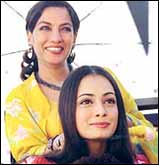 In our films and serials, whenever a woman is shown working, it is always out of need. It's never out of choice. It's like a woman has to work to make two ends meet, to keep the fire in the kitchen burning. It's always: 'Bechaari, she has to work to support her family.'
In our films and serials, whenever a woman is shown working, it is always out of need. It's never out of choice. It's like a woman has to work to make two ends meet, to keep the fire in the kitchen burning. It's always: 'Bechaari, she has to work to support her family.'
Why cannot a woman be shown working out of choice, the way men do? Can't a woman work because she enjoys it and is capable of doing it? Why should they be shown leaving home for employment as a sacrifice for the family?
I'm not saying a housewife is in any way inferior to a workingwoman. No, she isn't. But as an activist, as a woman, I would say the choice of being a housewife or pursuing a career should be left entirely to the woman and that choice should be respected. Her role, success and contribution in her field should be the basis of judging her, not just her relationship with her family. Isn't that what we do for men? (Laughs)
It is said the mother-daughter relationship in Tehzeeb is inspired by your relation with your mother [theatre actor Shaukat Azmi].
No. Please get this misconception corrected. I don't know from where the media gets such ideas. I've had perfectly good relations with my mother. It's nothing like what is shown in the film.
Writer Khalid Mohamed says he had discussions with you about your relationship with your mother while writing the script.
(Smiles) It's totally his script. I have not contributed in any way to his writing.
You've always maintained you want to be directed, that you hate being left to yourself to interpret your role. Did Khalid actually direct you?
Yes, he did. A film is ultimately a director's vision. And being the writer also, Khalid knew what he wanted. Of course, we did have a lot of fights on the sets. I always thought either I would kill him or he would kill me, but we made the film in the end (laughs).
The film is of a dysfunctional family, one of troubled relations between the mother and daughter. But the way Urmila and I got along on the sets, Khalid felt the closeness would show on screen (laughs).
It's been over a year since we saw you on screen in Vishal Bharadwaj's Makdee. And now suddenly you have more than a couple of films under production. Is it because these roles
| |||||||||||
I play a singer again in Mahesh Dattani's Morning Raga, but here the role isn't of an urban, chiffon sari-clad singer like the one I play in Tehzeeb. It's more in a rural background, with classical music, but again a strong career woman.
I also play a very small part in a film on Ahilyabai Holkar. Though the length of the role is very short, this character ultimately leads Ahilyabai to her tough stand.
When I take up roles, I have to make sure I do not end up endorsing the image of a meek woman that our films often portray. I owe that to the women's organisations I work with. I have to be able to identify with the character too.
Does that mean you would refuse to do the role of say a fundamentalist leader like Uma Bharti, because you do not support her brand of politics?
That's a very interesting question.
Yes, I would refuse to do a role modeled on someone like Uma Bharti, if I think the film will ultimately justify her views or lead the audience to empathise with the character.
But, at the same time, if the film takes a stand against the divisionary politics of this fundamentalist character, and if I can make my audience hate my character through a strong performance, then I would accept it.
![Shabana Azmi [right] in Makdee](http://im.rediff.com/movies/2003/dec/09makdee.jpg) I have to take such a stand because I don't see myself only as an actor in search of strong roles and awards. My commitments go much beyond that.
I have to take such a stand because I don't see myself only as an actor in search of strong roles and awards. My commitments go much beyond that.
I agree that being a trained actor, I should be able to prefix the words 'If I were' to a range of characters like, say Mother Teresa, Queen Elizabeth or Uma Bharti, and deliver a believable performance.
But I have to remember I am also answerable to the causes I am involved with.
Of late, many commercial stars have started accepting roles in so-called realistic, parallel cinema. Do you think it is unfair to trained and better actors who don't get roles in mainstream cinema because of their non-saleable status?
No. If the presence of mainstream actors can add visibility to realistic, meaningful films, there is no reason to object. One should look at how much it benefits the issues such films raise. If the film can reach a wider audience because of the actor, then why not?
But of course, one has to make sure the presence of the commercial actor should not take away from the film's sensibility. The film should not pander to the image of the actor.
Talking about non-commercial actors losing out on roles, if they are really good, they will continue to get their share (smiles mischievously).
You are supposed to assist director Aparna Sen on her first Hindi film Gulel [starring Ajay Devgan and Saif Ali Khan].
Yes. We share similar views and can understand each other very well.
Any plans to direct movies in the near future?
I don't think so. I'm not sure.
Now that you have retired from the Rajya Sabha, are you finding more time for yourself? Do you manage to indulge in activities that you may have had to avoid earlier on?
That is a misconception many people have. It is more than three months since I retired from the Rajya Sabha on August 28, but I have not had a single free day yet. My duties as a Parliamentarian may have ended but I haven't ended my commitments to all the social organisations, women's groups and slum dwellers' associations. I'm still actively involved with all of them.
I was in Delhi for a press conference to promote Tehzeeb last week. And there was this anti-bonded labour programme that Swami Agnivesh was involved in [organised by the Bandhuwa Mukti Morcha in New Delhi, December 2].
I have been associated with his activities for long and attended that event. I attended some other events also.
I am talking to you now. After this, I have a couple of more events lined up.
I have been thinking of taking a break for so long now; something like two or three months off everything, but I never manage to do that. Javed [poet, writer and Azmi's husband Javed Akhtar] tells me I am genetically incapable of doing that [laughs], I cannot stay home for long; maybe he likes it too. But I can't just cut myself off people I work with.
The problem is activists and groups working for various causes tend to rely on the same set of known faces or celebrities for all events. This leads to severe constraints of time for people like me. But if they were to widen their circle to include more and more new people, we would not have to say no to attending certain events.
But not many celebrities like to be associated with social and political causes, especially the type of events you are associated with.
Not really. Like this Swami Agnivesh event in Delhi I was talking about, when I mentioned it to Urmila, she was keen to come along. However, she could not make it because of her flight timings. If people like her can be brought in, the NGOs [non government organisations] will have more known personalities to endorse their campaigns.
To be an active part of so many social and political causes on a continuous basis, one also has to be well read. Besides, there must also be a lot of film offers, scripts to be read? With a schedule like yours, how do you find the time to do that?
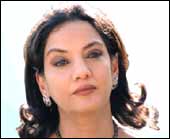 [Laughs] Most of it is while I'm travelling. I catch up on a lot when I'm moving between cities or sometimes even between events. And then, I also read at nights.
[Laughs] Most of it is while I'm travelling. I catch up on a lot when I'm moving between cities or sometimes even between events. And then, I also read at nights.
But yes, I've not had enough time for myself for long.
You've been known for, or rather targeted for your bold stand on issues like communalism, women's rights, equity and slum dweller's rights. What do you feel about Shiv Sena's latest anti-Bihari campaign?
These fundamentalist organisations take up such issues because it is easier to arouse people's sentiments. It is easier than talking of and providing roti, kapdaa aur makaan [food, cloth and shelter]. One can easily say these people come from outside and take away our jobs, dirty our cities, create law and order problems and we have to drive them out. But the same groups do not talk of or have any alternatives.
But a few months back, the same Shiv Sainiks had asked Javed saab to pen a Mumbai anthem on who is a true Mumbaikar, which he accepted. Wasn't that a clear ploy to misuse Javed saab's secular and progressive image for their vested interests? Don't you think by writing the song he actually played into their hands?
No, the Shiv Sena wanted Javed to write a song about who constitutes a Mumbaikar. But Javed is a very intelligent person, and also very fun-loving [laughs]. He gave them his version of a Mumbaikar, which includes people of all languages, religions, and regions; people who have made this city their home and who have made this city what it is. The Shiv Sena realised it did not serve their purpose; that it actually went against their divisionary politics and they just let the issue die down.
[Laughs] I think they forgot Javed has been around long enough to see through their political motives.
There have been reports in some Mumbai tabloids that Deepa Mehta's proposed project River Moon is actually a modified version of Water [Azmi and Nandita Das were to act in the film based on the plight of widows living in Varanasi; the project ran into trouble with Hindu fundamentalist groups adopting violent postures]. Do you think
[Interrupting] I have no idea about this new film you are talking about. Deepa has not spoken to me about it yet, and I don't think I should say anything based on media reports.
Attacks on creative expression have been increasing. Whether it is the murder of street theatre activist Safdar Hashmi in 1989 [Azmi had raised the issue at an International Film Festival venue in Delhi then], or on films like Fire or Water, the lack of immediate intervention by the law and order machinery, and deterrent punishment, seems to encourage more such happenings.
In Safdar's case, the judgement came last month after 15 years, which is too late. A case of justice delayed being justice denied. It should have come within 15 weeks or months of the attack.
But let's also remember the attack had led to spontaneous protests across the country. Many street theatre groups sprung up all over, performances increased and the issue of freedom of expression was highlighted, which was not what his murderers wanted.
Similarly, in the case of Fire, the film found huge support among the masses, which is not what any fundamentalist group would have aimed for. Such groups use violence to silence all dissent, not to promote a debate. So, it is not as if there is no ground support for freedom of artistic expression. It's just that secular groups have to take up these issues more openly and continuously.
Any plans to return to Parliament? Maybe contest next year's Lok Sabha elections?
[Shakes her head in disagreement] I won't say 'Never.' In politics, one cannot say that. But I find the idea of being part of one political party very limiting. The party's truth becomes your truth. You lose your independent voice.
When I visit my hometown of Azamgarh, people tell me I should enter electoral politics. But even if I contest and win, as an independent one-member party in the Lok Sabha, I would hardly get a minute to participate in the debates. And that is not enough to get any issue highlighted.
I did much more as a nominated Rajya Sabha member. And I am doing quite some work outside of Parliament too.
Click here for More Interviews



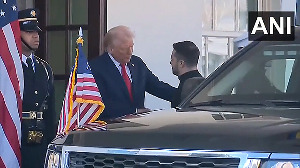

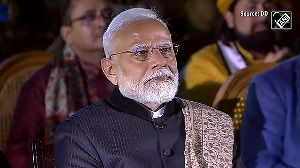
 © 2025
© 2025